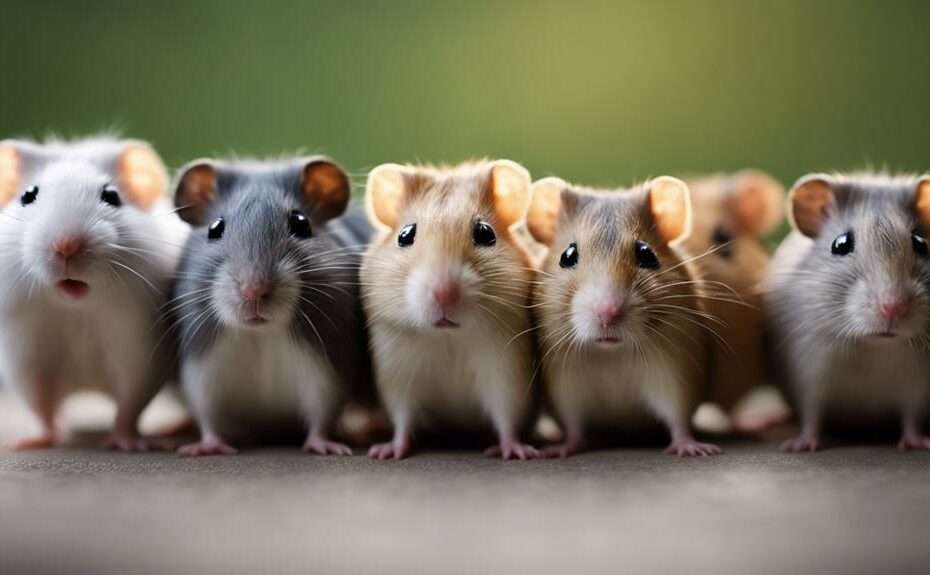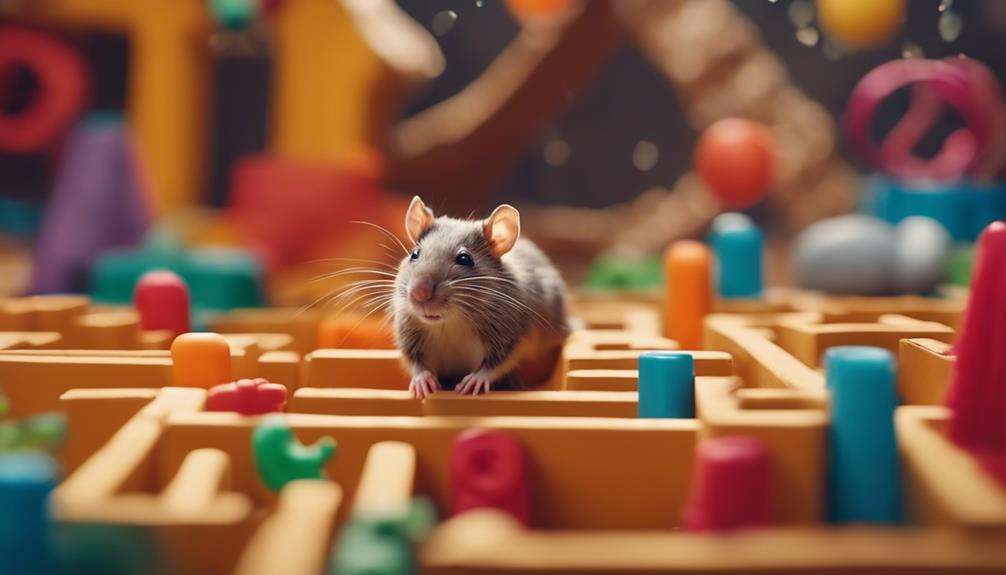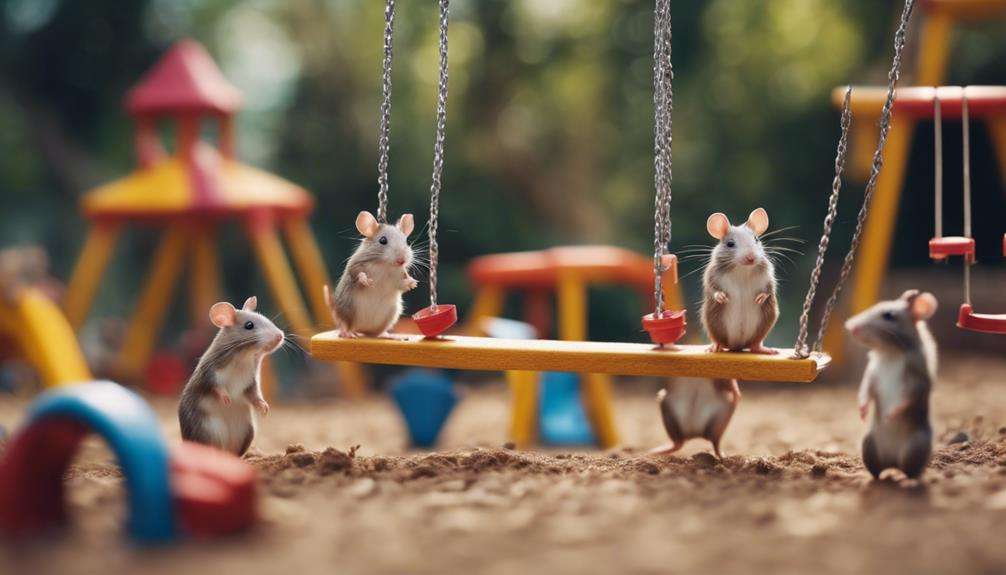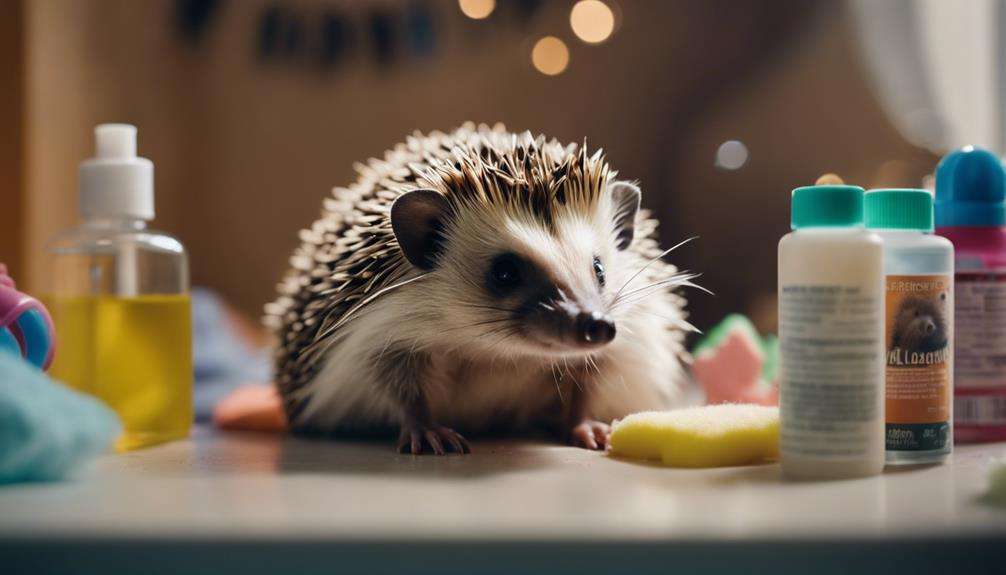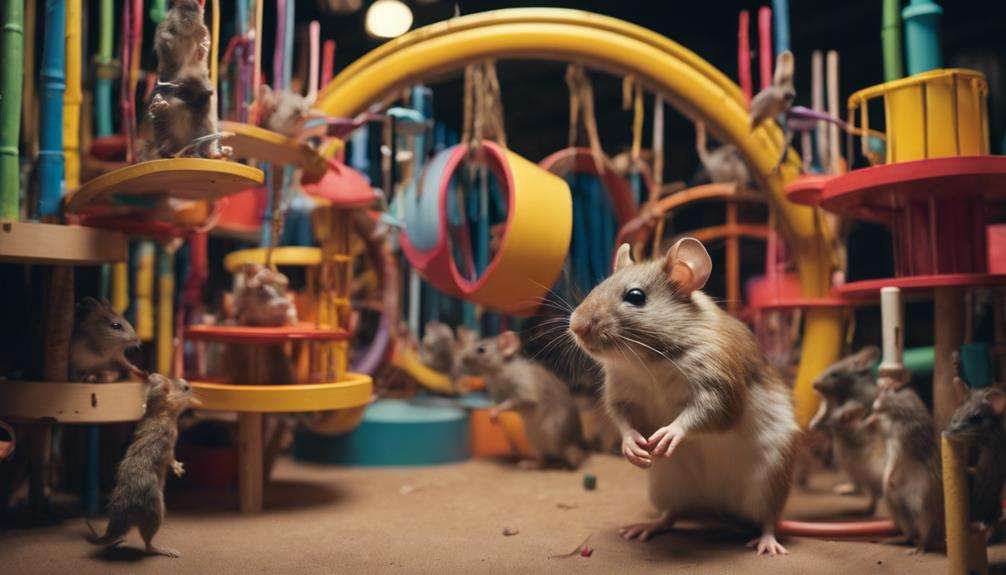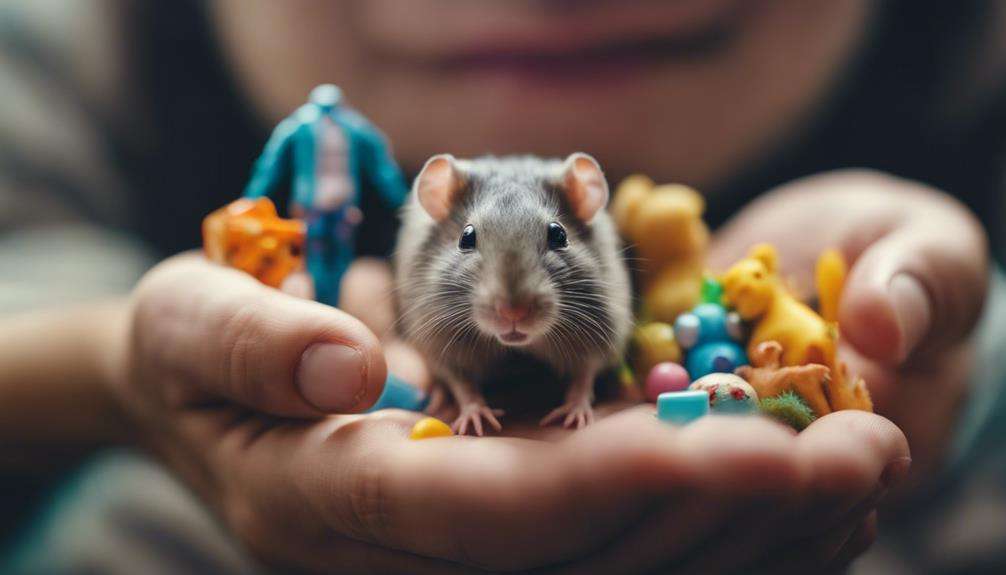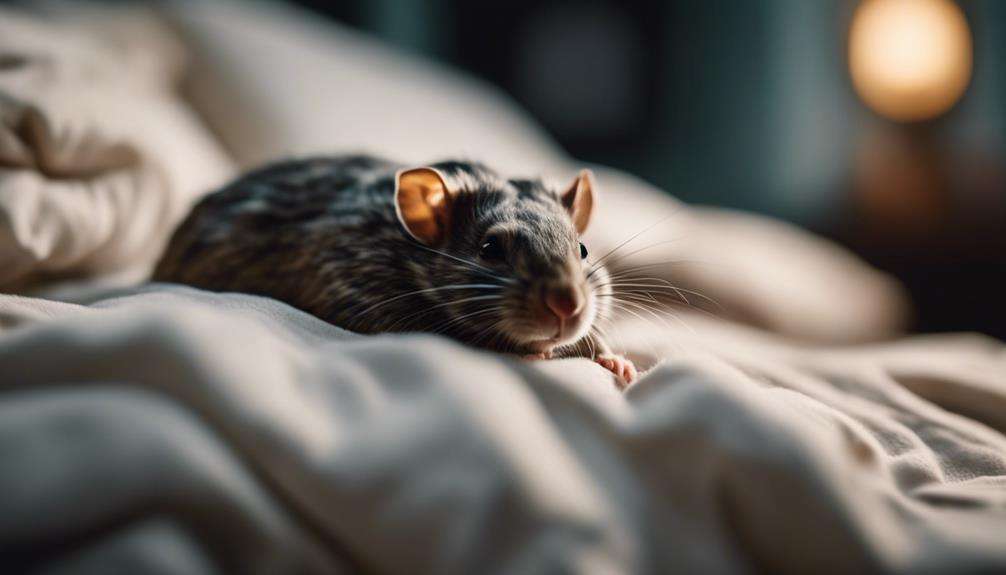Have you ever wondered which quirky rodent species could outlive your expectations as a pet owner? Understanding the lifespan differences among these adorable creatures is crucial for providing them with the best care possible.
From the short-lived hamsters to the surprisingly long-lived chinchillas, each species has its own unique requirements that can impact their longevity.
By delving into the lifespan comparison tips provided in this article, you'll gain valuable insights to help ensure a fulfilling and healthy life for your beloved furry companions.
Key Takeaways
- Proper care significantly impacts rodent lifespan.
- Regular vet check-ups detect health issues early.
- Balanced diet crucial for longevity in rodents.
- Suitable living conditions enhance pet rodents' lifespan.
Longevity of Pet Mice
Pet mice, typically having a lifespan of 1-2 years, can live up to 3 years with proper care and attention to their health needs. To ensure the longevity of your pet mouse, it's crucial to provide a well-cared-for environment. Start by offering a balanced diet that includes pellets, fresh vegetables, and occasional treats. Maintaining a clean and spacious cage with proper bedding and enrichment activities is also essential for their well-being.
Regular veterinary check-ups play a significant role in detecting any health issues early on, potentially extending your pet mouse's lifespan. These check-ups allow for preventive measures to be taken, ensuring your mouse stays healthy and happy. While the maximum reported age for a pet mouse is around 4 years, achieving this milestone requires dedication to their care and health. By creating a nurturing environment and staying vigilant about their needs, you can help your pet mouse live a longer and fulfilling life.
Hamster Lifespan Comparison
When considering the lifespan of hamsters, it's essential to understand the aging process, factors that influence how long they live, and the crucial health care they require.
Factors like genetics, diet, environment, exercise, and mental stimulation all play a role in determining a hamster's lifespan.
Hamster Aging Process
Exploring the aging process in hamsters reveals key insights into their lifespan and care requirements for optimal health and longevity.
Hamsters typically live 2-3 years, but some can reach 5 years with proper care and luck, with the record being 7 years.
To enhance longevity, ensure a spacious cage, offer a varied diet, and create a mentally stimulating environment.
Regular veterinary check-ups and monitoring for health changes are crucial for their well-being.
Understanding how hamsters age enables you to adjust their care routines accordingly, supporting their overall health and extending their lifespan.
Factors Affecting Lifespan
As hamsters age, various factors come into play that significantly influence their lifespan and overall well-being. Here are some key factors affecting the longevity of your hamster:
- Proper Care: Providing your hamster with the right environment, diet, and mental stimulation can help extend its lifespan.
- Regular Veterinary Check-ups: Scheduled visits to the vet can catch any health issues early on, contributing to a longer life for your hamster.
- Balanced Diet: Offering a well-balanced diet rich in nutrients is crucial for maintaining your hamster's health and extending its lifespan.
- Suitable Living Conditions: Ensuring your hamster has a spacious and enriched living environment is essential for its physical and mental well-being, ultimately impacting its longevity.
Health Care Essentials
To ensure the longevity of your hamster and promote its overall health, prioritizing proper health care essentials is crucial. Hamsters, as pet rodents, require attentive care to prevent common health conditions.
Provide your pet mouse with a spacious cage or enclosure, ensuring it has ample room to move and explore. A balanced diet and regular veterinary check-ups are essential for maintaining your rodent pet's well-being.
Monitoring for any signs of illness or changes in behavior is crucial for early intervention. Offering mental stimulation through toys and activities can enhance your hamster's quality of life.
Rat Lifespan Insights
When considering the lifespan of pet rats, it's important to acknowledge the significant impact of captivity on their longevity. Domesticated pet rats typically live 2-4 years, with the oldest known rat reaching 7 years old, a stark contrast to the short lifespan of wild rats, which is usually less than a year due to various factors.
Here are some insights to help you understand and improve the lifespan of your pet rat:
- Genetics and Breed: These factors play a crucial role in determining a rat's lifespan, underscoring the significance of responsible breeding practices.
- Metabolism and Heart Rates: Rats have high metabolisms and heart rates, ranging from 300-500 beats per minute, which can impact their longevity.
- Proper Husbandry and Diet: Providing a well-rounded and balanced diet, along with proper husbandry practices, can significantly enhance your pet rat's lifespan.
- Healthcare: Regular veterinary check-ups and attentive dental care are essential in prolonging the lifespan of your pet rat.
Gerbil Longevity Facts
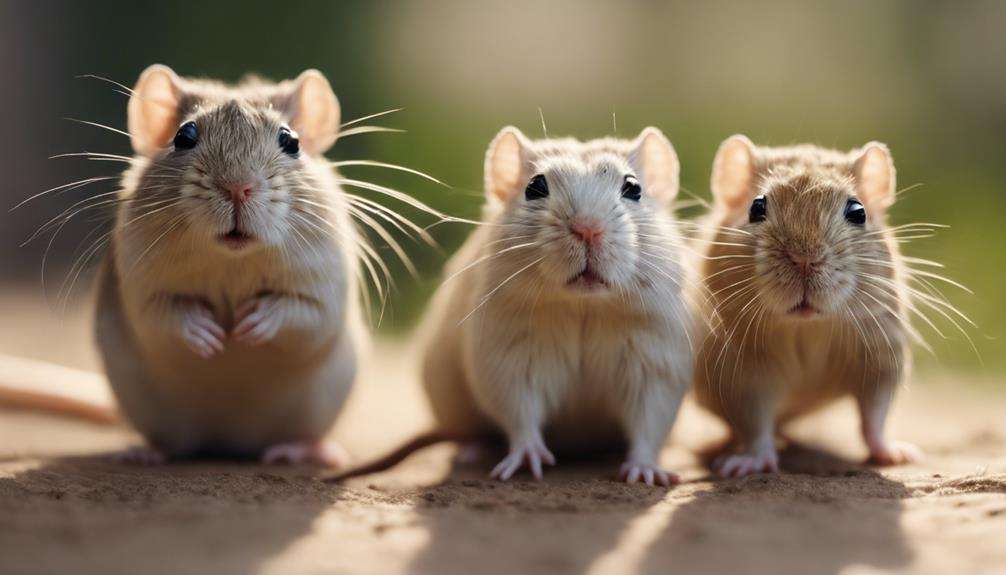
Gerbils typically live between 3 to 5 years in captivity, but with proper care, diet, and environment, you can help them live longer lives.
These social animals thrive in pairs or small groups, benefiting from mental stimulation and exercise opportunities that can enhance their lifespan.
Regular veterinary check-ups and monitoring for signs of illness are crucial for maintaining gerbil health and longevity.
Gerbil Age Expectancy
With an average lifespan of 3-5 years in captivity, gerbils are known for their relatively longer longevity compared to other small rodents. To help your gerbil live a long and healthy life, ensure they receive proper care, including a balanced diet, regular exercise, and suitable living conditions. Providing mental stimulation and companionship can also play a significant role in extending your gerbil's lifespan. By incorporating these elements into your gerbil's routine, you can create an environment that promotes overall well-being and enhances their quality of life.
Gerbil Age Expectancy Tips:
- Offer a balanced diet rich in seeds, grains, and fresh vegetables.
- Encourage regular exercise through the use of a running wheel or toys.
- Maintain a clean and spacious living environment with adequate ventilation.
- Stimulate your gerbil's mind with interactive toys and the company of other gerbils.
Factors Influencing Lifespan
To maximize your gerbil's lifespan, understanding the key factors that influence longevity is crucial for providing optimal care and ensuring a healthy and fulfilling life for your furry companion.
Gerbils, as pets, typically live between 3 to 5 years in captivity. Proper care, including a balanced diet and a suitable environment, plays a significant role in enhancing their longevity.
Gerbils are prone to health issues such as dental problems and obesity, so maintaining their health through regular vet check-ups and a nutritious diet is essential.
Providing mental stimulation and companionship also contributes to extending your gerbil's lifespan. By addressing these factors and ensuring your pet gerbil receives proper care and attention, you can help them live a longer and happier life.
Guinea Pig Lifespan Overview
The lifespan of guinea pigs typically ranges from 4.5 to 5.8 years, with the potential to live up to 14 years with proper care and attention. If you want your quirky rodents to enjoy a long and healthy life, consider the following tips:
- Provide a Healthy Diet: Ensure your guinea pigs have a balanced diet rich in vitamin C, fresh hay, vegetables, and pellets to support their overall health and longevity.
- Social Interaction: Guinea pigs are social animals that require companionship to thrive. Regular interaction with their human caregivers and fellow guinea pigs can contribute to their well-being and longevity.
- Appropriate Cage Size: Offering a spacious and stimulating environment for your guinea pigs is essential. Provide a cage that allows them to move around freely, exercise, and explore to promote their physical and mental health.
- Well-Cared-For Companions: By being attentive pet owners, providing proper nutrition, socializing with them, and ensuring they have a comfortable living space, you can help your guinea pigs live a longer and happier life.
Degus Lifespan Considerations
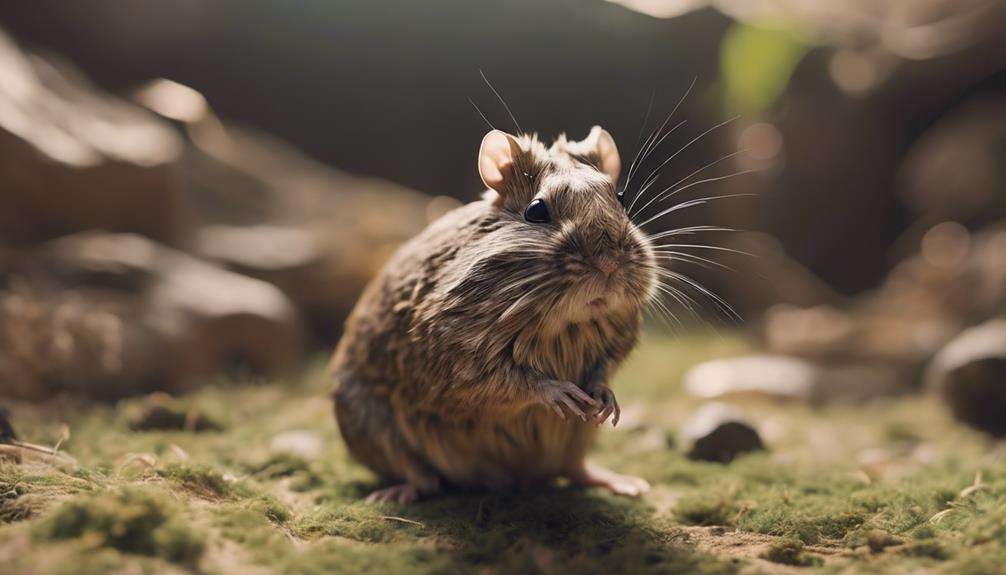
Guinea pigs and degus are both popular choices as pets, each with distinct lifespan considerations that reflect the importance of proper care and attention.
Degus, as rodents, have an average lifespan of 5-9 years in captivity. To ensure they reach their maximum lifespan, it's crucial to provide them with a suitable environment and proper care. Offering a balanced diet, mental stimulation, and companionship can significantly contribute to increasing a degu's lifespan.
Being social animals, degus thrive when kept in pairs or groups, emphasizing the importance of companionship for their well-being. Regular veterinary check-ups are essential for monitoring their health and addressing any signs of illness promptly.
Chinchilla Lifespan Analysis
Analyzing the lifespan of Chinchillas reveals their impressive longevity among pet rodents, with an average lifespan ranging from 15 to 20 years. Here are some essential factors to consider for ensuring your Chinchilla lives a long and healthy life:
- Larger Size: Chinchillas' relatively larger size compared to other rodents contributes to their extended lifespan.
- Diet: Providing a well-balanced diet rich in hay, pellets, and fresh water is crucial for their health and longevity.
- Living Environment: Offering a spacious and well-ventilated living environment is vital for their well-being.
- Veterinary Check-ups: Regular check-ups with a specialized exotic animal veterinarian can help detect and prevent health issues early on.
Taking care of your Chinchilla's dental care, providing exercise opportunities, mental stimulation, and keeping them in a cool and dry environment are also essential for ensuring they live a full and happy life. By paying attention to these key aspects, you can help your Chinchilla thrive for many years to come.
Exotic Rodent Lifespan Variations
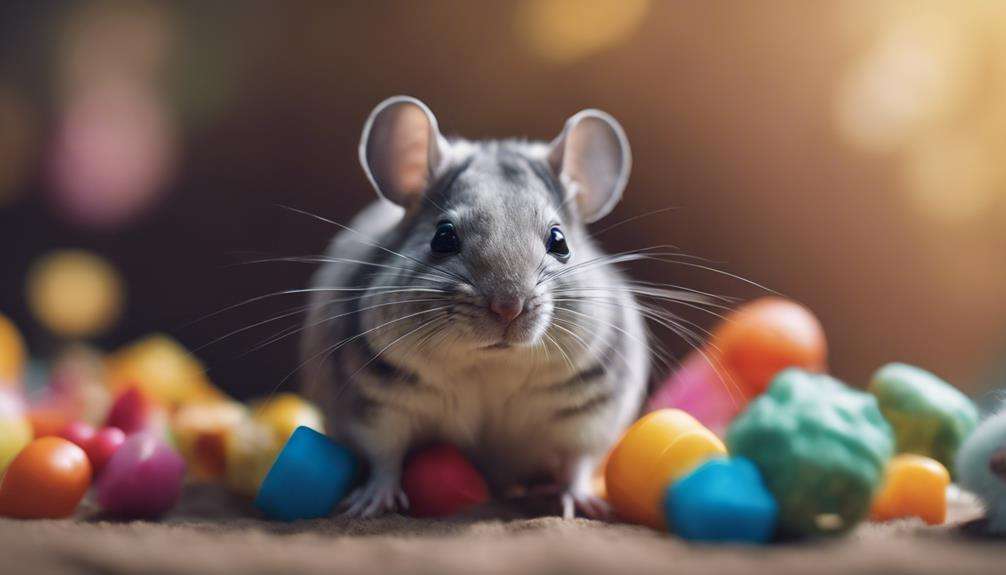
Considering the diverse lifespans of various exotic rodents, it's fascinating to explore the longevity differences among these unique pets.
Chinchillas stand out with the longest lifespan, reaching up to 20 years in captivity. Guinea pigs, on the other hand, typically live between 5-7 years, although some can exceed 8 years with proper care.
Degus, another exotic rodent species, commonly enjoy a lifespan of 5-9 years when provided with suitable living conditions. In contrast, mice and hamsters have shorter lifespans, averaging between 1-4 years.
Surprisingly, naked mole rats hold the longevity record among rodents, living over 30 years in captivity. Understanding these lifespan variations is crucial for exotic rodent owners to provide the appropriate care and ensure a fulfilling life for their pets.
Frequently Asked Questions
What Rodent Lives the Longest as a Pet?
Chinchillas live the longest as pets, reaching up to 20 years in captivity. Guinea pigs and degus surpass many rodents, living over 5 years. Smaller rodents like mice and hamsters generally have shorter lifespans, around 1-2 years.
What Is the Healthiest Pet Rodent?
When considering the healthiest pet rodent, chinchillas stand out for their long lifespan. With proper care, they can live up to 20 years. Their diet and environment play crucial roles in maintaining their well-being.
What Pet Is Like a Rat but Lives Longer?
If you're seeking a pet similar to a rat but with a longer lifespan, consider a chinchilla. These lively creatures can live up to 20 years, providing you with many years of companionship and joy.
What Is the Easiest Rodent to Take Care Of?
Like a breeze on a sunny day, caring for guinea pigs is a joy. They are low maintenance, beginner-friendly, and social creatures that bring laughter to your home. With a long lifespan, they make perfect companions.
Conclusion
Congratulations on taking the time to learn about the lifespan of your quirky rodents! By understanding the unique needs and longevity of each species, you can provide the best care possible for your furry friends.
Remember, with proper care and attention, your pet rodents can live longer than a century! Keep up the great work in ensuring the health and happiness of your beloved companions.
